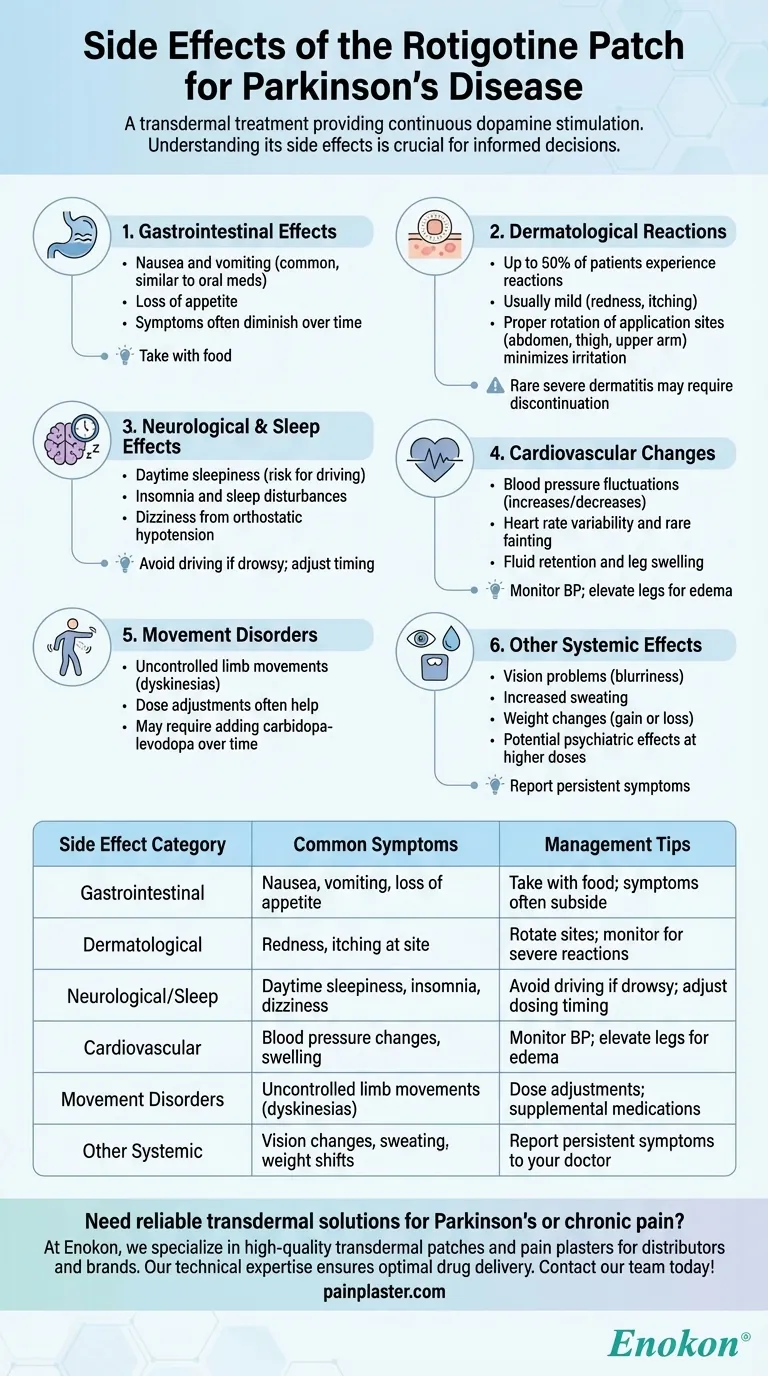The Rotigotine Patch is a transdermal treatment for Parkinson's disease that offers continuous dopamine stimulation. While effective, it carries several side effects ranging from common mild reactions to less frequent but more serious systemic effects. These include gastrointestinal issues like nausea, dermatological reactions at the application site, neurological symptoms such as dizziness and sleep disturbances, cardiovascular changes, and movement disorders. Understanding these effects helps patients and caregivers make informed decisions about treatment options.

Key Points Explained:
-
Gastrointestinal Side Effects
- Nausea and vomiting are among the most frequently reported issues, occurring similarly to oral Parkinson's medications.
- Loss of appetite may accompany these symptoms, potentially affecting nutritional intake.
- These effects often diminish over time as the body adjusts to the medication.
-
Dermatological Reactions
- Up to 50% of patients experience application site reactions, typically mild (e.g., redness, itching).
- Proper rotation of application sites (e.g., abdomen, thigh, upper arm) can minimize skin irritation.
- Severe allergic contact dermatitis is rare but may require discontinuation.
-
Neurological and Sleep-Related Effects
- Daytime sleepiness/somnolence occurs in many patients, posing risks for activities like driving.
- Insomnia and sleep disturbances reflect dopamine's complex role in sleep regulation.
- Dizziness may result from orthostatic hypotension (low blood pressure upon standing).
-
Cardiovascular Changes
- Blood pressure fluctuations (both increases and decreases) have been observed, particularly during dose adjustments.
- Heart rate variability and rare cases of fainting require monitoring, especially in elderly patients.
- Fluid retention and leg swelling may exacerbate cardiovascular risks.
-
Movement Disorders
- Uncontrolled limb movements (dyskinesias) may emerge, similar to other dopaminergic therapies.
- Dose adjustments often help manage these motor complications.
- Progressive disease typically necessitates adding medications like carbidopa-levodopa.
-
Other Systemic Effects
- Vision problems (blurriness, difficulty focusing) are less common but noteworthy.
- Increased sweating and weight changes (gain or loss) reflect metabolic influences.
- Psychiatric effects like hallucinations, though not highlighted here, may occur at higher doses.
The patch's advantages—steady drug delivery and dosing flexibility—must be weighed against these potential reactions. Most side effects are manageable, and the Rotigotine Patch remains a valuable option for maintaining motor function in Parkinson's patients. Regular follow-ups allow clinicians to tailor treatment while minimizing adverse outcomes.
Summary Table:
| Side Effect Category | Common Symptoms | Management Tips |
|---|---|---|
| Gastrointestinal | Nausea, vomiting, loss of appetite | Take with food; symptoms often subside over time |
| Dermatological | Redness, itching at application site | Rotate application sites; monitor for severe reactions |
| Neurological/Sleep | Daytime sleepiness, insomnia, dizziness | Avoid driving if drowsy; adjust dosing timing |
| Cardiovascular | Blood pressure changes, swelling | Monitor BP; elevate legs for edema |
| Movement Disorders | Uncontrolled limb movements (dyskinesias) | Dose adjustments; supplemental medications |
| Other Systemic Effects | Vision changes, sweating, weight shifts | Report persistent symptoms to your doctor |
Need reliable transdermal solutions for Parkinson's or chronic pain?
At Enokon, we specialize in manufacturing high-quality transdermal patches and pain plasters for healthcare distributors and brands. Our technical expertise ensures optimal drug delivery with minimized side effects. Whether you need existing formulations or custom R&D for specialized treatments, we provide end-to-end support.
Contact our team today to discuss your transdermal therapy needs!
Visual Guide

Related Products
- Herbal Eye Protection Patch Eye Patch
- Hydra Gel Health Care Eye Patch
- Prostate Pain Kidney Health Care Patch for Men
- Asthma Cough and Pain Relief Patch for Adults and Kids
- Menthol Gel Pain Relief Patch
People Also Ask
- What factors should be considered when purchasing eye patches? Essential Guide for Safe & Effective Use
- What are the steps for properly using eye patches? Maximize Benefits for Your Delicate Eye Area
- How quickly can you see results from using under eye patches? Instant Brightening & Long-Term Benefits
- When should a doctor be consulted regarding the use of this patch? Key Safety Guidelines
- How can using eye patches contribute to a self-care skincare routine? Boost Hydration & Relaxation
















